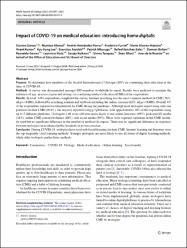Impact of COVID-19 on medical education: Introducinghomo digitalis

Göster/
Erişim
info:eu-repo/semantics/openAccessTarih
2021Yazar
Gravas, StavrosAhmad, Mümtaz
Hernandez-Porras, Andres
Furriel, Frederico
Alvarez-Maestro, Mario
Kumar, Anant
Lee, Kyu-Sung
Azodoh, Evaristus
Mburugu, Patrick
Sanchez-Salas, Rafael
Bolton, Damien
Gomez, Reynaldo
Klotz, Laurence
Kulkarni, Sanjay
Tanguay, Simon
Elliott, Sean
de la Rosette, Jean J. M. C. H.
Üst veri
Tüm öğe kaydını gösterKünye
Gravas, S., Ahmad, M., Hernandez-Porras, A., Furriel, F., Alvarez-Maestro, M., Kumar, A. ... de la Rosette, J. J. M. C. H. (2021). Impact of COVID-19 on medical education: Introducinghomo digitalis. World Journal of Urology, 39(6), 1997-2003. https://doi.org/10.1007/s00345-020-03417-3Özet
Purpose To determine how members of the Societe Internationale d'Urologie (SIU) are continuing their education in the time of COVID-19. Methods A survey was disseminated amongst SIU members worldwide by email. Results were analyzed to examine the influence of age, practice region and settings on continuing medical education (CME) of the respondents. Results In total, 2494 respondents completed the survey. Internet searching was the most common method of CME (76%; allps < 0.001), followed by searching journals and textbook including the online versions (62%; allps < 0.001). Overall, 6% of the respondents reported no time/interest for CME during the pandemic. Although most urologists report using only one platform for their CME (26.6%), the majority reported using >= 2 platforms, with approximately 10% of the respondents using up to 5 different platforms. Urologists < 40 years old were more likely to use online literature (69%), podcasts/AV media (38%), online CME courses/webinars (40%), and social media (39%). There were regional variations in the CME modality used but no significant difference in the number of methods by region. There was no significant difference in responses between urologists in academic/public hospitals or private practice. Conclusion During COVID-19, urologists have used web-based learning for their CME. Internet learning and literature were the top frequently cited learning methods. Younger urologists are more likely to use all forms of digital learning methods, while older urologists prefer fewer methods.
WoS Q Kategorisi
Q1Scopus Q Kategorisi
Q1Kaynak
World Journal of UrologyCilt
39Sayı
6Koleksiyonlar
- Makale Koleksiyonu [3777]
- PubMed İndeksli Yayınlar Koleksiyonu [4230]
- Scopus İndeksli Yayınlar Koleksiyonu [6574]
- WoS İndeksli Yayınlar Koleksiyonu [6631]

















